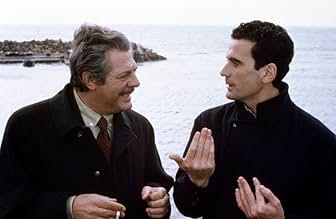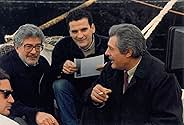AVALIAÇÃO DA IMDb
7,3/10
1,4 mil
SUA AVALIAÇÃO
Adicionar um enredo no seu idiomaThe visit of a lawer to his military son is an opportunity to recall the past, discuss the future and find a meeting point between two diametrically opposite personalities.The visit of a lawer to his military son is an opportunity to recall the past, discuss the future and find a meeting point between two diametrically opposite personalities.The visit of a lawer to his military son is an opportunity to recall the past, discuss the future and find a meeting point between two diametrically opposite personalities.
- Direção
- Roteiristas
- Artistas
- Prêmios
- 5 vitórias e 7 indicações no total
- Direção
- Roteiristas
- Elenco e equipe completos
- Produção, bilheteria e muito mais no IMDbPro
Avaliações em destaque
'Che ora è', Ettore Scola's 1989 film, is an admirable demonstration of the fact that great films can often be simple and that sophisticated effects or complex plots are not always necessary to reach the hearts of viewers. All one needs is a script that tells a story or describes a true situation in words that work well on screen and the right actors to transform the images into living episodes that move or convey meaningful messages. Sounds simple, right? But how many directors have the talent, luck and audacity to make such movies? Ettore Scola is certainly one of them and if 'Che ora è' is a rarely mentioned and perhaps lesser known entry in his filmography, it is time, I think, for a re-evaluation.
The film tells the story of a day in the lives of a father and his son who meet after many years of distance - perhaps not so much geographically, but emotionally. Marcello, the father, is a very wealthy lawyer who has no problem making expensive presents such as an apartment in the center of Rome or a luxury car. Michele, the son, is in the military and doesn't really seem to know what he wants to do with his life. The father comes from Rome to the harbor town of Civitavecchia where his son is serving to spend a day with him and try to get to know him better, to guide him and help him in the way he believes is best. The two men are very different, however. Gradually, we understand that it is not just a generation gap and a difference in communication styles. Marcello had been a busy and absent father. The attempt to reconnect with his son is belated, accompanied by exaggerated gifts, inappropriate advice, intrusive pressure. There is a lot of talk, but verbal communication does not work well. The opening that occurs at a certain point is occasioned by shared memories and the watch inherited from Marcello's father, Michele's grandfather, which is for the latter a more precious gift than all the other treasures offered by his father. The two may get to know each other a little better, but their worlds remain different. As normal, after all.
I have already said that there is a lot of talking in the film, and perhaps some viewers will be bothered by this aspect. I think that for the screenwriters the verbosity (excessive even for an Italian film) was intentional. In this way they emphasized better than anywhere else that in communication words do not always help and sometimes even harm - they mask and distort. The moments of closeness are non-verbal, and perhaps it would have been good if there were a little more of them. The interpretation of the two actors is masterful. For Marcello Mastroianni this is one of the most impressive roles of the (too early) end of a formidable career. Massimo Troisi is an excellent partner and the two of them are believable and moving. I think many of the men who saw this film recognized themselves in the characters of the father and the son, maybe in both. I dare say that 'Che ora è' (no question mark, THIS is the original title!) is one of the most moving films about father-son relationships ever made.
The film tells the story of a day in the lives of a father and his son who meet after many years of distance - perhaps not so much geographically, but emotionally. Marcello, the father, is a very wealthy lawyer who has no problem making expensive presents such as an apartment in the center of Rome or a luxury car. Michele, the son, is in the military and doesn't really seem to know what he wants to do with his life. The father comes from Rome to the harbor town of Civitavecchia where his son is serving to spend a day with him and try to get to know him better, to guide him and help him in the way he believes is best. The two men are very different, however. Gradually, we understand that it is not just a generation gap and a difference in communication styles. Marcello had been a busy and absent father. The attempt to reconnect with his son is belated, accompanied by exaggerated gifts, inappropriate advice, intrusive pressure. There is a lot of talk, but verbal communication does not work well. The opening that occurs at a certain point is occasioned by shared memories and the watch inherited from Marcello's father, Michele's grandfather, which is for the latter a more precious gift than all the other treasures offered by his father. The two may get to know each other a little better, but their worlds remain different. As normal, after all.
I have already said that there is a lot of talking in the film, and perhaps some viewers will be bothered by this aspect. I think that for the screenwriters the verbosity (excessive even for an Italian film) was intentional. In this way they emphasized better than anywhere else that in communication words do not always help and sometimes even harm - they mask and distort. The moments of closeness are non-verbal, and perhaps it would have been good if there were a little more of them. The interpretation of the two actors is masterful. For Marcello Mastroianni this is one of the most impressive roles of the (too early) end of a formidable career. Massimo Troisi is an excellent partner and the two of them are believable and moving. I think many of the men who saw this film recognized themselves in the characters of the father and the son, maybe in both. I dare say that 'Che ora è' (no question mark, THIS is the original title!) is one of the most moving films about father-son relationships ever made.
Mastroianni and Troisi show in this movie what it means to be a honest actor. They act in the Italy of the late 80s. The feelings of modernity mix with the memories of the past. Mastroianni is a father who doesn't know his son for who he truly is. This makes him suffer, nonetheless Scola sends the message that it is never to late to sort out some sort of compromise between a father and son who love each other. Troisi on his part represents a character who lives life without all the fuss buzzing the 'successful' life. In those days as well as today a really difficult thing to do. The simplicity and cleanliness with which they share their feelings as characters is really fulfilling. This movie is a gift they made to us and both actors and director delivered a truly minimalist piece of art. Thank you!!!!
10lobo-21
I think both men and women at the screening I attended identified with at least one of the main characters. Mastroianni and Troisi complement each other perfectly in this honest portrayal of a parent whose grown son is a stranger. It's a shame this was never widely seen in the US.
I don't know what paradise looks like except: there surely will be a cinema in it, and "Che ora è" will be playing on a giant screen, in original Italian, I will be able to speak Italian and manage to sneak in for free because the beautiful box office girl fancies me.
But mainly there will be "Che ora è?" playing.
But mainly there will be "Che ora è?" playing.
"Che ora è?" is a great minimalist movie, since it makes you feel the love, and in the same time the disease between a father and a son through simple attitudes, and words ("what time is it?"!!). And such feelings can make you suffer - but a little bit, but in a light way - since they are true. Marcello Mastroianni and Massimo Troisi are so perfect playing their parts, that you may believe Marcello to be your father and Massimo to be your son. It's a shame this is not one of the most famous movies by Ettore Scola, also in Italy.
Você sabia?
- ConexõesEdited into Laggiù qualcuno mi ama (2023)
Principais escolhas
Faça login para avaliar e ver a lista de recomendações personalizadas
- How long is What Time Is It??Fornecido pela Alexa
Detalhes
- Data de lançamento
- Países de origem
- Idioma
- Também conhecido como
- What Time Is It?
- Locações de filme
- Empresas de produção
- Consulte mais créditos da empresa na IMDbPro
Contribua para esta página
Sugerir uma alteração ou adicionar conteúdo ausente

Principal brecha
By what name was Que Horas São? (1989) officially released in Canada in English?
Responda




















